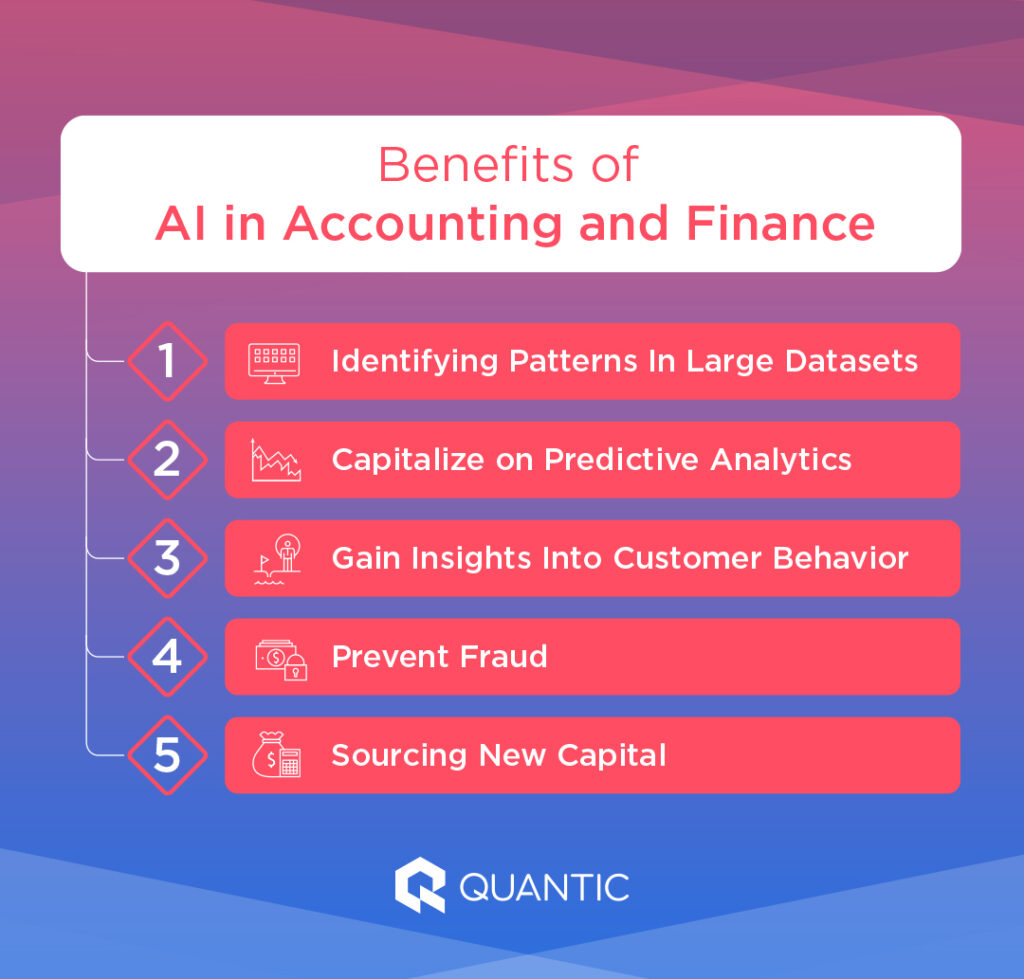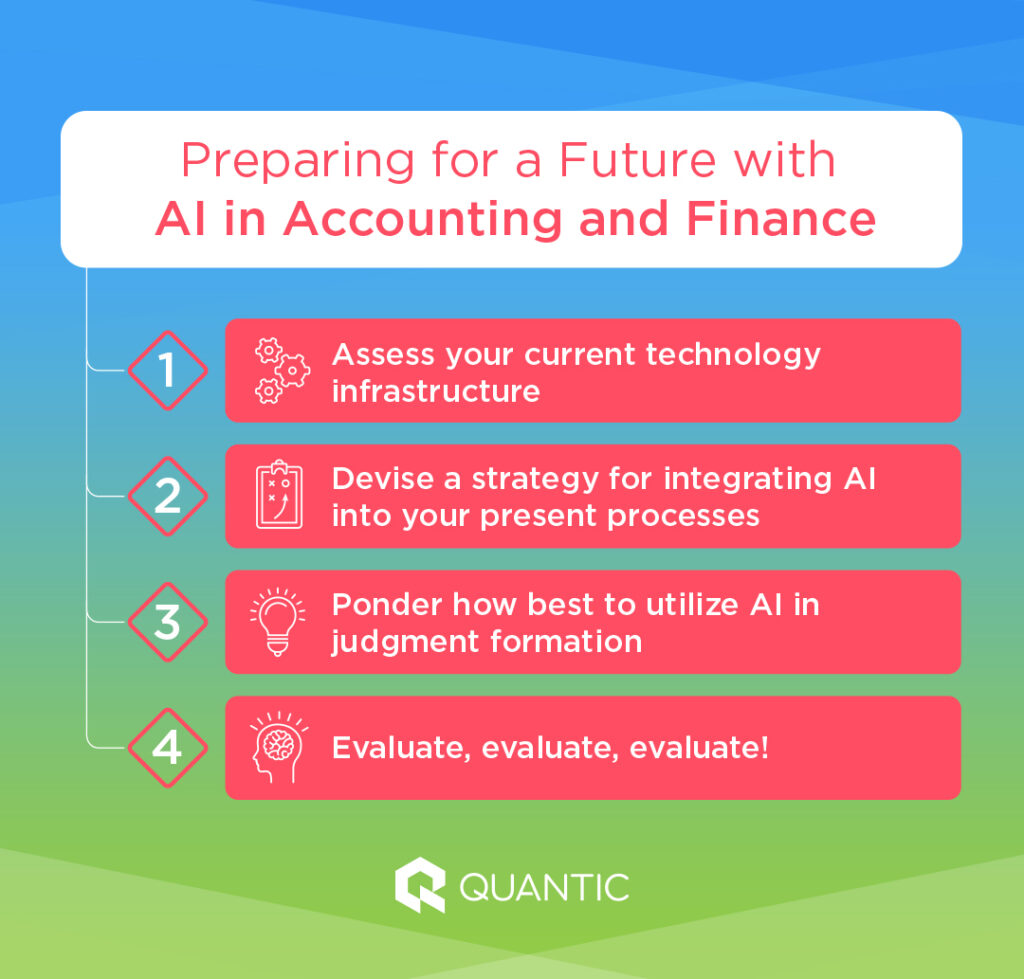ACCOUNTING
The Unquestionable Benefits Of AI In Accounting & Finance for 2024
AI is revolutionizing the way we make financial decisions, forecast future trends, and prepare for a future with increased automation.
From improved accuracy in data analysis to more efficient ways of managing transactions, it’s clear that AI has immense implications for this field.
In fact, AI in the Accounting industry is projected to grow 30% year on year from 2023-2027: according to the Mordor Intelligence statistics report.
This blog post will explore how AI is being used in the present and its effect on financial decision-making, as well as its potential for forecasting and automating finance processes.
We’ll also take a closer look at how businesses can utilize AI for predictive analytics and what potential opportunities exist to incorporate AI into financial operations.
Join us now as we dive deep into understanding these innovative technologies.
How is AI used in accounting and finance?
AI is being applied to automate mundane duties, like bookkeeping, data inputting and reconciliations. This allows professionals to focus their efforts on more meaningful work that requires higher-level problem solving skills.
AI-based tools are also becoming an invaluable asset to financial professionals by helping them make better decisions faster than ever before. With its ability to quickly analyze large datasets, it is revolutionizing the way accountants work today.
Exploring the Benefits of AI in Accounting and Finance

Benefit 1 – Identifying Patterns In Large Datasets
One key benefit of AI in accounting and finance is its ability to quickly identify patterns in large datasets.
By utilizing ML algorithms and NLP technology, businesses can swiftly detect patterns or discrepancies in their financial data that may have been previously undetectable. For example, an algorithm could analyze past transactions and flag any suspicious activity before it becomes a larger issue.
This capability gives organizations greater visibility into their finances while also providing them with the opportunity to take proactive measures if needed.
Benefit 2 – Capitalize on Predictive Analytics
Sophisticated algorithms can accurately anticipate future trends based on past data.
By leveraging AI-driven analytics, organizations can gain a strategic advantage by being able to make informed decisions about their resource allocation and future strategies.
Taking an active approach to utilizing advanced insights from historical information allows executives to be one step ahead of their competition.
Executives can remain agile when dealing with ever-changing market conditions.
Benefit 3 – Gain Insights Into Customer Behavior
AI-powered systems can provide valuable insights into customer behavior by analyzing past transactions or predicting future outcomes based on current market conditions.
This allows financial institutions to better understand their customers’ needs and develop strategies tailored specifically for them.
However, in order for a company to properly utilize this data companies need someone who understands business operations as a whole. The Quantic MBA can provide this background knowledge.
According to a study conducted by independent researchers at Stanford academics, students in Accounting and Finance at Quantic achieved similar or superior results compared to traditional MBA students from some of the world’s top 10 business schools, such as Stanford, Harvard, Wharton, and Fuqua.
Additionally, Quantic students accomplished this feat in a fraction of the time, completing their studies over five times faster.
Quantic student Avik Bhowmick started his journey in software engineering and advanced into a position as VP & Global Team Lead @ financial giant JP Morgan Chase. Click here to learn more about his journey into leadership in finance, in the age of AI:

Benefit 4 – Prevent Fraud
AI can also be utilized to detect and prevent frauds by quickly analyzing vast amounts of data, allowing companies to respond promptly and reduce losses.
By analyzing large datasets in real time, AI-based systems can detect suspicious activity much faster than traditional methods allowing companies to respond quickly if a problem arises while minimizing losses due to fraudulent activities.
In addition, AI tools are also being used in the banking sector where they help banks assess creditworthiness of applicants through detailed analysis of their financial history thus reducing loan defaults while increasing profitability at the same time.
Benefit 5 – Sourcing New Capital
Advanced machine learning techniques have enabled organizations to access new sources of capital through automated trading platforms, allowing them to buy and sell assets from anywhere around the world without manual intervention.
The automated trading platforms have enabled companies to optimize their profits margins and efficiency, allowing them to gain a competitive advantage in the market.
The potential benefits provided by this technology has already started transforming industries ranging from healthcare and retailing all the way to finance and banking; leading many experts to believe that it will continue playing an even bigger role going forward.
Quantic merges a technology-enabled platform with a high-quality Executive MBA program. This unique approach allows individuals like Matthew, who are smart traders, to acquire additional skills and knowledge. What’s impressive is that this can be achieved despite Matthew’s busy schedule as a full-time working parent.

Harnessing the Power of AI for Financial Forecasting
Artificial intelligence (AI) also has the potential to revolutionize financial forecasting.
Why? Because AI can do the following…
- Offer more precise forecasts of future market movements by utilizing data-driven algorithms and sophisticated analytics.
- Examine prior customer conduct to identify which elements sway demand the most
- Scour through data from various sources such as news articles, social media posts and financial statements to detect potential risks before they become issues
- Optimize portfolios by recommending specific stocks or bonds that have higher expected returns given current market conditions and individual investor preferences (e.g. risk tolerance levels or desired return rates)
Harnessing the power of artificial intelligence for financial forecasting enables businesses and investors alike to gain an edge when making important decisions related to money.
Ultimately, with advancing tech, these abilities will become increasingly sophisticated and provide deeper understanding of global markets.
Preparing for a Future with AI in Accounting and Finance

Organizations must take proactive steps now to ensure they are prepared for the future of accounting and finance, which is increasingly automated through artificial intelligence (AI).
Here are some tips for doing that…
Tip 1 – Assess your current technology infrastructure
Is it up-to-date enough to support AI? If not, investing in new hardware or software may be necessary.
It’s also important to identify any existing data silos and develop a plan for breaking them down so all relevant information can be accessed quickly by an AI system.
Businesses should devise a plan for the incorporation of AI into their operations, guaranteeing that it adheres to sector guidelines and regulations.
It is also vital to recognize any existing data silos and concoct a plan for dismantling them so all pertinent information can be retrieved expeditiously by an AI system.
Tip 2- Devise a strategy for integrating AI into your present processes
This strategy should also ensure conformity with industry regulations and standards.
Tip 3 – Ponder how best to utilize AI in judgment formation
For example, when employing predictive analytics models driven by machine learning algorithms such as neural networks or deep learning techniques; managers ought to ascertain what criteria will inform predictions – this could incorporate historical data points or customer feedback surveys – together with set parameters around accuracy levels mandatory before action is taken on those forecasts.
Tip 4 – Evaluate, evaluate, evaluate!
Evaluate effectiveness of an AI system after implementation. To guarantee it is performing correctly and delivering the expected outcomes long-term.
This might involve tracking key performance indicators such as return on investment (ROI) from specific projects or customer satisfaction scores from services provided by the company’s chatbot platform powered by natural language processing (NLP).
Organizations must proactively leverage AI in order to stay competitive, or else they will be at risk of falling behind.
Will artificial intelligence take over accounting?
AI can detect previously hidden correlations and insights from a variety of data sources quickly, allowing for more precise financial reporting with lower associated costs. This will lead to greater efficiency and accuracy for financial reporting while reducing costs associated with traditional methods of analysis.
But, artificial intelligence will not take over accounting.
Accounting is a complex profession that requires an understanding of financial regulations and processes which cannot be replicated by AI.
Furthermore, the ability to interpret data and provide insight into trends requires human judgment which AI cannot replicate.
Therefore, while AI may help with certain accounting tasks such as bookkeeping and tax preparation, it will never substitute for the expertise of an experienced accountant who can interpret data to make sound decisions.
Conclusion
The possibilities of artificial intelligence in accounting and finance are endless. AI has the capacity to completely transform how decisions are made financially, prognostication and even business operations as a whole. To remain competitive, professionals must stay abreast of AI’s progress to leverage its potential for their organization’s future success.
Transform your career with Quantic School of Business and Technology‘s cutting-edge online education programs that explore the potential of artificial intelligence in accounting and finance. Join us to gain the knowledge you need to stay ahead in this rapidly changing field!




